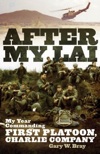 This short, well-written account of a young lieutenant’s eventful 1969-70 tour of duty in Vietnam, After My Lai, has all the earmarks of a standard memoir. It starts with a brief rundown of the author’s childhood growing up in eastern Oklahoma. That includes tales of his uncle’s and father’s World War II experiences—something that virtually all of us in the Vietnam War generation have in common.
This short, well-written account of a young lieutenant’s eventful 1969-70 tour of duty in Vietnam, After My Lai, has all the earmarks of a standard memoir. It starts with a brief rundown of the author’s childhood growing up in eastern Oklahoma. That includes tales of his uncle’s and father’s World War II experiences—something that virtually all of us in the Vietnam War generation have in common.
Bray then covers the reasons why he joined the Army in the spring of 1968, less than a year after graduating from high school. In essence, he was sick of school but knew he would go to college and figured the G.I. Bill was the only way he could swing it. “The Army,” Bray says, “was the only choice that made sense to me.”
We then get descriptions of basic training and advanced infantry training at Fort Polk and Officer Candidate School at Fort Benning. After getting his lieutenant’s bars in February 1969, Bray had a brief assignment at Fort Lewis before shipping out to Vietnam in September. Then came his assignment—and the reason this memoir stands out.
Bray became a platoon commander in a company in the Americal Division’s 20th Infantry Regiment—1st Platoon, Charlie Company, the same platoon that 2nd Lt. William Calley had commanded when he orchestrated the My Lai massacre a year and a half earlier. None of the members of Calley’s platoon were still there. Most had rotated home; a few who extended were elsewhere in-country.
“When I was assigned to lead First Platoon,” Bray says, “the brigade commander told me our mission was to kill the enemy and win the hearts and minds of the Vietnamese people. Winning hearts and minds would prove a difficult task with the unit that had slaughtered close to five hundred people a few miles away.”
Bray goes on to present an evocative account of his day-to-day life with Charlie Company, using a good mixture of dialogue and straight forward narrative. To his credit, Bray quickly learned what too many young lieutenants never did—to listen to the men who had spent time in the bush.
Some of the writing stands with the best in the genre. That includes this passage, in which Bray describes what happened to him when he was wounded: “One second I was looking up at the ridge, the next I was lying flat on my back, staring up at the blue sky and watching a dark gray mushroom cloud rising slowly upward. We had had no warning. No metallic click, no thud from a grenade hitting the ground, only the deafening sound of a huge explosion.…I rolled over on my right side and looked down at the top of my right wrist. Every time my heart beat, a stream of blood squirted out of it onto the ground.”
University of Oklahoma, 2010




